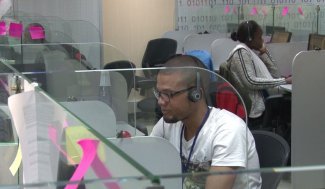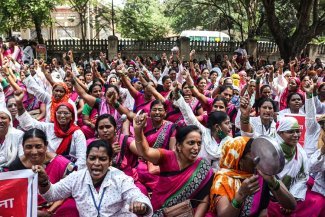Pictured here, the headquarters of American multinational Sitel in Rabat, Morocco.
In Morocco, things are often not what they seem, especially when it comes to rights. Both the country’s constitution and its body of laws guarantee individual freedoms and social rights within a democratic framework. But when these laws clash with the interests of Morocco’s powerful economic stakeholders, or those of the makhzen, the country’s ruling elite centred on the monarch, they become little more than words on paper. Nowhere is this more true than with trade union freedoms, which explains why only 6 per cent of contract workers in Morocco are unionised.
“When a group of workers becomes combative, within a company or a trade union, they find a way to silence them,” says Mohamed Hakech, a veteran trade unionist and the former secretary general of the National Federation of the Agricultural Sector. The most common tools used against workers are threats, dismissals and, for the most recalcitrant, imprisonment. More subtle tactics are also employed, including splintering the labour movement into countless unions and promoting yellow unions.
This hostile environment has led to the creation of tansiquiyat in some industries. These coordinating bodies provide workers with informal structures to fight for their rights outside of traditional unions.
While business interests have always had a strong influence on Morocco’s political leadership, many believe that they are more powerful now than ever before. In the country’s political circles, there is talk of a “marriage of politics and business,” not least because the current prime minister, Aziz Akhanouch, is himself the country’s wealthiest businessman.
Precarious working conditions are particularly widespread in the agricultural sector, which employs a third of the country’s workforce and is one of the mainstays of its economy. Only a quarter of the sector’s one million employees have a contract and social security coverage. That share is even lower among the industry’s female workers. According to Hakech, the discrimination that farm workers face is so blatant that it is written into law: “The national minimum wage is around 2,900 dirhams [€265], whereas it is only 2,100 dirhams [€190] in the agricultural sector. What’s more, agricultural workers have longer working days, at 48 hours a week, versus 44 hours for other workers”. As Hakech explains, the government has promised to put an end to these discriminatory practices for more than two decades but has thus far failed to take action. It has most recently promised to resolve these disparities in 2028.
The sector that has given the Moroccan government the most headaches of late is education. In 2023 thus far, representatives of more than 100,000 teachers and interim workers at the Ministry of Education have organised several days of strikes and brought public schools and colleges to a standstill, demanding recognition as civil servants. “Approximately 40 per cent of the Ministry’s workers are hired on a temporary basis. Some have been in this situation for more than 15 years,” says union activist Moulay Taj, a teacher who runs the website annakaba.com (nakaba means union in Arabic).
Like many other workers, Taj chooses to wage his battles outside the traditional trade unions, which he sees as propping up the regime rather than defending workers’ rights. “In the 1970s, they spearheaded the opposition. But the regime has been hollowing them out from the inside through economic blackmail [most of their resources are public subsidies], harassment of their most militant activists, lack of internal democracy, and so on. Their current role is to domesticate workers,” says Taj, who cites the demands being made by education workers as an example. On 14 January, the main trade unions reached an agreement with the Ministry, which Taj believes does not meet the aspirations of the majority of workers. As a result, many are still fighting.
This also explains why the coordinating body, or tansiquia, is calling for new mobilisations. “The coordinating body is much more popular with interim workers than the traditional unions. I would say that around half of the 250,000 workers at the Ministry of Education feel represented by it,” says Taj. As informal, unincorporated groups, the tansiquiyat enjoy greater flexibility. However, they are still subject to repression and their leaders face threats and arrests if they decide to launch mobilisation campaigns, especially strikes.
While trade union rights are officially recognised, in practice, they don’t apply to multinationals or to the state
“In Morocco, the right to strike is recognised in the constitution, but it is not respected. Article 288 of the penal code punishes with prison sentences the ‘obstruction of work,’ which is vaguely defined and used to arrest people participating in picket lines,” says Khadija Riady, former president of the Moroccan Association for Human Rights. Sometimes workers suffer minor reprisals, such as dismissal or demotion for their oppositional political activities. “In the education sector, I would estimate that in recent years around 300 people have suffered reprisals for being active in committed left-wing parties, such as the Democratic Way or Justice and Charity [an illegal but tolerated Islamist movement],” says Taj.
Another vibrant area of union activity, albeit with less of an impact on the lives of Moroccans, is the call centre industry. Over the last decade, Morocco has become a magnet for multinationals offering customer services, mostly in French but also in Spanish. In total, the sector employs an estimated 120,000 people.
Multinationals that are well-aware of the trade union rights enshrined in international conventions, and apply them thoroughly in their home countries, choose to ignore them in Morocco.
Benabdallah Badreddine, 40, an IT specialist and employee of the US multinational Sitel, has experienced this situation first-hand. “When we informed officials at the headquarters in Rabat that we wanted to create a union section, the reprisals began. Of the 18 who petitioned, a total of 15 were fired, one after another, without going before the disciplinary board. They were not given a reason and they were unable to defend themselves,” says Badreddine. He is one of the three employees of this ‘group of 18’ who is still employed by the company. Sitel’s repression of trade unions in Morocco is listed in the International Trade Union Confederation’s (ITUC) Global Rights Index 2022.
Although he has not lost his job, Badreddine has been harassed for months by his bosses, who initially tried to buy him off by offering him a promotion in exchange for giving up his union aspirations. He refused, preferring instead to launch a campaign for the reinstatement of his colleagues. “We have already organised two sit-ins in front of the company’s headquarters, and also sought the mediation of several public institutions. At one meeting, the Sitel representatives didn’t even bother to show up,” says Badreddine. He is not worried about the prospect of being fired. In the sector, basic salaries are not much higher than the minimum wage (around 4,000 dirhams or €365) and target bonuses often represent a third of the final salary.
“The actions of multinationals often violate the Morocco’s labour code. They are illegal, but the state is unable to enforce them.” says Ayoub Saoud, 36, who has more than ten years of experience working in call centres. There is a shortage of labour inspectors and they lack sufficient authority, so lawsuits often don’t even make it to court. When they do, companies prefers to pay paltry fines rather than reinstate employees. “What does a fine of 30.000 dirhams mean for these companies? Absolutely nothing,” says Saoud. He further claims that companies in the sector coordinate by circulating ‘blacklists’ of workers dismissed for union activism. It may come as a surprise to some analysts that Morocco, a country so effective at controlling and stifling its civil society, is unable to enforce its own laws against multinationals.
For Saoud, a key element in the victories achieved by the sector’s trade unions has been the coordination and support they’ve received from their counterparts in Western countries, especially those countries where companies that subcontract call centre services to multinationals like Sitel are based. When faced with trade union disputes, many of these companies threaten to relocate further afield to countries like Madagascar. “The same thing they previously did in Morocco they are now doing in Sub-Saharan African countries. They go there in search of even lower wages and even fewer rights for workers. That’s what they threaten us with when we demand our rights,” says Saoud, who jokingly wonders what the next stage of globalisation will be: “Where do you think they’ll go next, Antarctica













